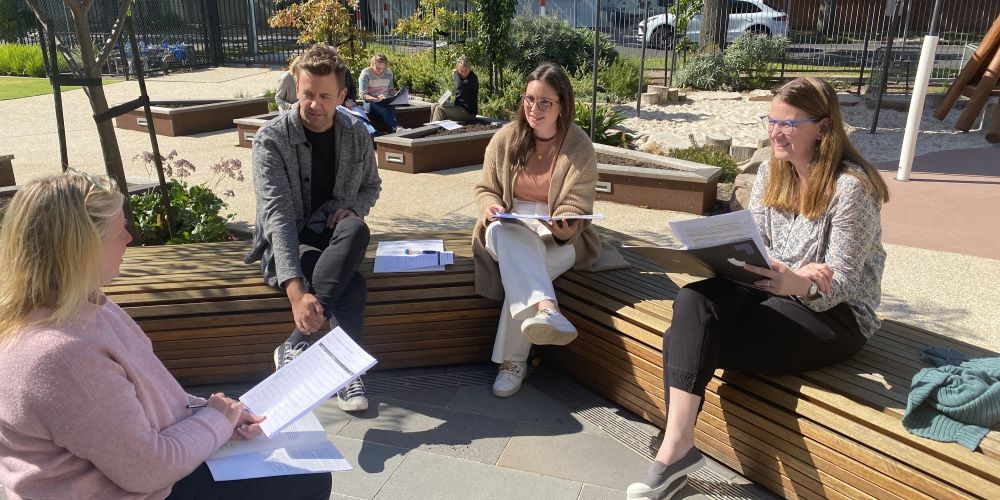Building a Culture of Quality: Implementation of the QT Model

Lauriston Girls’ School places great importance on using the best evidence-based teaching and learning approaches to support its staff and more than 900 students across the combined junior and secondary school. The evidence-based QT Model is at the heart of the school’s approach to producing high-quality teaching programs, assessment tasks, and classroom teaching.
Despite the impact of repeated Covid-19 lockdowns throughout 2020 and 2021, more than 140 of Lauriston’s teachers have engaged in Quality Teaching Rounds (QTR) professional development, a program designed to embed the QT Model in teachers’ daily practice. The program is now central to the school’s strategic plan.
Kate Hehir, Lauriston’s Junior School Assistant Principal, has spearheaded the school’s engagement with QT since 2019. According to Kate the impact has been immediate and profound.
“QTR creates genuine opportunities to connect with colleagues and spend valuable time talking deeply about educational ideas and pedagogy using a common dialogue. By opening up our classrooms and inviting others to observe our teaching, we have further improved collegiality through safe and supportive processes. Lessons receive validating and affirming feedback which continues to build teacher morale. Importantly, we’ve been able to build a common knowledge and share expertise, all underpinned by an evidence-based model,” Kate said.
That was certainly the experience of Terry Abraham, the Junior School Art Teacher.
An investment in all teachers and students
Classroom observations had been a feature of Lauriston’s approach to teacher development prior to 2019, using a model called Cultures of Thinking, (CoT) from Harvard University. Although elements of CoT were highly valuable, teachers found the observational process lacked the structure to produce rich, targeted feedback. Kate then turned to some homegrown research.
In 2019, the University of Newcastle was embarking on an unparalleled program of research investigating the impact of QTR on student achievement through a series of randomised controlled trials, thanks to a $17.2 million grant from the Paul Ramsay Foundation. This funding came on the back on an earlier trial which provided empirical evidence that teacher participation in QTR improved the quality of teaching and teacher morale.
QTR brings teachers together in small groups, called professional learning communities, where they work together to observe, analyse, and discuss each other’s teaching, and pedagogy more broadly. Teachers use the evidence-based QT Model, which treats teaching as intellectual work, to guide their observations and discussion. At the same time, the powerful QTR processes flatten power hierarchies, validate what teachers are already doing well, make them feel valued, and build strong professional relationships. Most importantly, QTR strengthens teaching practice to enhance student learning.
Interested in learning more, Kate attended a two-day QTR Foundational workshop in Sydney in 2019. After she presented her findings back to the school, Lauriston commissioned Laureate Professor Jenny Gore AM to run two sets of QTR workshops in 2020 and 2021 for staff in both the junior and senior schools. Over the next two years, QTR was rolled out across Lauriston with all staff given the opportunity to form professional learning communities and engage in QTR.
A key part of teachers’ ongoing professional development is recording a written reflection on their lesson observation and QTR experience. Teachers meet with a member of the School Executive to share their thoughts on the process, opportunities for improving their practice, additional professional learning to support this improvement, and their future professional aspirations.
Overwhelmingly, the experience has been incredibly positive.
Building a culture of quality
The experience of Lauriston’s teachers has now been backed up by empirical academic research. In October 2023, the University of Newcastle published its final report to the Paul Ramsay Foundation. Three of four randomised controlled trials demonstrated that QTR simultaneously improves teaching quality, teacher morale and school culture, and student academic achievement in mathematics and reading. These large-scale studies involved 1,400 teachers and 14,500 students from 430 state schools across New South Wales, Victoria and Queensland. No other school-based intervention has been so thoroughly tested or amassed such a comprehensive body of evidence.
At the beginning of 2024, Lauriston embarked on the next stage of its QT journey, bringing QT Adviser Michelle Ware to the Junior School where she led a professional learning (PL) day on Enhancing Assessment Practice.
Utilising this approach is now embedded across the Junior School. Using existing scheduled PL time, teachers work together in small groups coding and analysing upcoming assessment tasks through the lens of the QT Model, using processes similar to QTR. This improves the task quality and engagement for the students as well as giving the teacher richer assessment information on student performance.
According to Michelle, there is great value in having “fresh eyes” on tasks, particularly when meeting with colleagues from different subject areas and year levels.
“Teachers find this approach incredibly valuable. It helps refresh their thinking on the how, what, when, where, and why of their assessment practice,” she said.
For Kate, having everyone in the school working with the same model and getting the same message, has helped build a clear vision for quality teaching and learning at Lauriston.
“This approach is building positive morale and culture amongst our teachers by providing recognition for what people are doing well and creating opportunities to share and celebrate success,” she said.
“We’re a QT school, focused on having the best evidence informing our teaching and learning,” said Kate.
With the latest release of the Australian Curriculum, Lauriston is currently reviewing, creating and documenting programs and units of work reflecting this new version of the national curriculum. Using the QT Model to guide this process will ensure their programs have high intellectual quality and significance to students lives both in and outside the classroom, and produce learning environments that boost engagement. A one-day QT: Strengthening Program Design workshop has been scheduled for December 2024 to provide the whole school with support for quality curriculum design.

